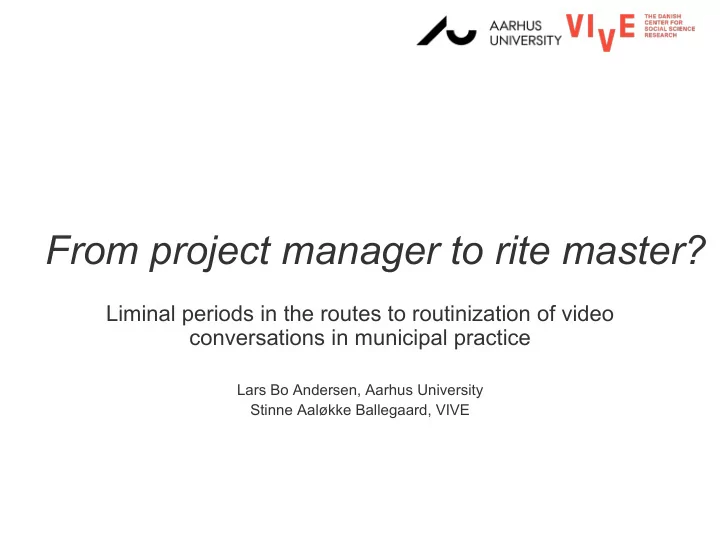

From project manager to rite master? Liminal periods in the routes to routinization of video conversations in municipal practice Lars Bo Andersen, Aarhus University Stinne Aaløkke Ballegaard, VIVE
The life of IT projects? The (linear) life of projects The states (of progression) of a project
Of course not 3
The life of a project − The Teledialogue project (2013-2018): ▪ Developing a concept for video-conversation ▪ 7 municipalities and around 50 case manages and placed children. • A lot of start-stop movements ▪ Our argument: the project went through several liminal transitions − Background debate: failure, success and sustainability of projects ▪ Development, research, innovation, digitization, etc.. 1. Include users, consider context… 2. PM models, best practice, etc. 3. Tinkering, improvisation, negotiations, design-in-use… 4
An STS life? Tom Scott-Smith (2014) How projects rise and fall: the lifecycle of a dietary modernisation scheme 5
The life of Teledialogue in Municipality X 6
Birth of an ”exciting new project” • Teledialogue “fitted right in” − the municipality was already using video conversations with adult citizens − part of the prevention strategy (case managers more present) “There are many challenges in keeping contact with youths in foster- or institutionalized care. Just adhering to the legal requirements [of two conversations a year] is difficult. So perhaps this could replace, supplement or assist in keeping contact and ensuring a good placement” (Department manager at pre-project meeting, 2014) 7
The project is ”cornered” • Project manager resigns • Case managers are overburdened (stress, sick leaves, etc.) • Friction with another project − More (physical) meetings with more people ”around the table” • Marginalisation − Unanswered emails and phone-calls, delays, non-appearance, postponements, etc. “I can’t deal with that [project] now, I am putting out fires” (response from case manager to researcher, 2014) 8
A new begining (in another department) • Project is reoriented from youths to children − Related to the “Swedish” model − Twice as many follow-ups and case managers more ”present” • A stable period of “appropriation” by case managers and children ”She [the case manager] is trying to build a better relation to the child , where he feels more comfortable with her, so that she may help him. And video is part of that. She feels she has gotten to know him better, she can see if he is upset, and they have started teasing each other – they did not do that before” (Conversation during car-ride, 2015) 9
Fading out • The official pilot period stops • Various attempts to ”sustain” the use of video conferencing − Workshops, movies, guides, encouragement, etc. − Case managers ”prefer not to” ”I: How would you describe this period? PM: A form of slow death, with me on the sideline cheering. First as the coordinator and later as their manager trying to say, should we try with some other children, what was it really that was meaningful for us, and all sorts of motivations.” (Interview with project manager, 2018) 10
Another start? • Project is relocated to ”upper management” and a vision of the “digital municipality” − From optimization of administration to new ways of working with citizens ”We need to revitalize and also to find a direction. It is going to be a long and difficult process because this is not how we are used to thinking about digital technologies. There are so many possibilities, but what is it really that we want [to achieve in relation to citizens]?” (Interview with team manager, 2018) 11
So how to understand the transitions in Teledialogue? • Segregation à liminality à integration 1. Expected and unexpected • A tribe goes to war or projects in crisis 2. Betwixt and between established categories of existence à marginalized ▪ No progression, not failed (yet), in the middle of it all, yet treated as if was not there – at least, in periods, we could not find the project 3. An ontological transformation of both neophyte and his/her “society” • With each revival came transformations of citizens, strategy, department, potential future, etc. 12
TODO • We only have shallow insights (projects in crisis are a sore spot) • Participant observations during future periods of “project crisis” (perhaps during research projects) − How are liminal projects categorized, negotiated, and positioned in organisations and by participants? − What are the rituals of project transitions? − Etc. etc. John Law (1996) – The Manager and His Powers 13
So what? • Liminal periods are inevitably “part of life” − Are project managers ”rite masters”? − And why does so much research try to eliminate them? • From (inherent) factors of failure, success, sustainability (etc.) towards the convoluted movement of projects through their lifetime − The immanent dynamic of coherence and incoherence 14
Recommend
More recommend